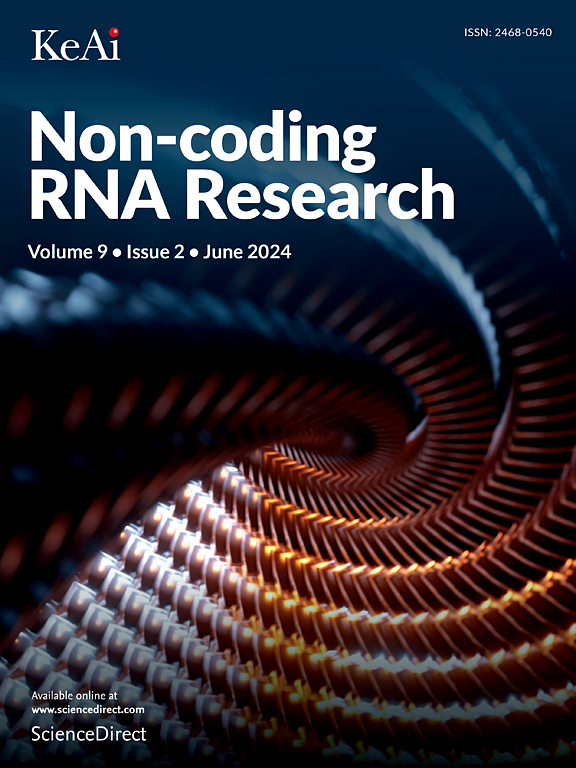Long non-coding RNA transcripts in Mycobacterium tuberculosis-host interactions
IF 5.9
3区 生物学
Q1 BIOCHEMISTRY & MOLECULAR BIOLOGY
引用次数: 0
Abstract
Tuberculosis (TB) persists as a significant health threat, affecting millions of people all over the world. Despite years of control measures, the elimination of TB has become a difficult task as morbidity and mortality rates remain unaffected for several years. Developing new diagnostics and therapeutics is paramount to keeping TB under control. However, it largely depends upon understanding the pathogenic mechanisms of Mycobacterium tuberculosis (Mtb), the causative agent of TB. Mtb is an intracellular pathogen capable of subverting the defensive functions of the immune cells, and it can survive and multiply within humans' mononuclear phagocytes. Emerging evidence indicates that long non-coding RNAs (lncRNAs), a class of RNA molecules with limited coding potential, are critical players in this intricate game as they regulate gene expression at transcriptional and post-transcriptional levels and also by chromatin modification. Moreover, they have been shown to regulate cellular processes by controlling the function of other molecules, such as DNA, RNA, and protein, through binding with them. Recent studies have shown that lncRNAs are differentially regulated in the tissues of TB patients and cells infected in vitro with Mtb. Some dysregulated lncRNAs are associated with essential roles in modulating immune response, apoptosis, and autophagy in the host cells, adding a new dimension to TB pathogenesis. In this article, we provide a comprehensive review of the recent literature in this field and the impact of lncRNAs in unraveling pathogenic mechanisms in TB. We also discuss how the studies involving lncRNAs provide insight into TB pathogenesis, especially Mtb-host interactions.
结核分枝杆菌与宿主相互作用中的长链非编码RNA转录物
结核病仍然是一个重大的健康威胁,影响着全世界数百万人。尽管采取了多年的控制措施,但由于发病率和死亡率多年来未受影响,消除结核病已成为一项艰巨的任务。开发新的诊断和治疗方法对于控制结核病至关重要。然而,这在很大程度上取决于对结核病病原体结核分枝杆菌(Mtb)的致病机制的了解。结核分枝杆菌是一种能够破坏免疫细胞防御功能的细胞内病原体,它可以在人的单核吞噬细胞内存活和繁殖。新出现的证据表明,长链非编码RNA (lncRNAs)是一类编码潜力有限的RNA分子,在这一复杂的游戏中发挥着关键作用,因为它们在转录和转录后水平以及染色质修饰上调节基因表达。此外,它们已被证明通过与其他分子(如DNA、RNA和蛋白质)结合来控制它们的功能,从而调节细胞过程。最近的研究表明,lncrna在结核患者的组织和体外感染结核分枝杆菌的细胞中受到不同的调控。一些失调的lncrna在调节宿主细胞的免疫反应、凋亡和自噬中起重要作用,为结核病的发病机制增加了一个新的维度。在本文中,我们对该领域的最新文献以及lncrna在揭示结核病致病机制中的作用进行了全面的综述。我们还讨论了涉及lncrna的研究如何提供对结核病发病机制的见解,特别是mtb -宿主相互作用。
本文章由计算机程序翻译,如有差异,请以英文原文为准。
求助全文
约1分钟内获得全文
求助全文
来源期刊

Non-coding RNA Research
Medicine-Biochemistry (medical)
CiteScore
7.70
自引率
6.00%
发文量
39
审稿时长
49 days
期刊介绍:
Non-coding RNA Research aims to publish high quality research and review articles on the mechanistic role of non-coding RNAs in all human diseases. This interdisciplinary journal will welcome research dealing with all aspects of non-coding RNAs-their biogenesis, regulation and role in disease progression. The focus of this journal will be to publish translational studies as well as well-designed basic studies with translational and clinical implications. The non-coding RNAs of particular interest will be microRNAs (miRNAs), small interfering RNAs (siRNAs), small nucleolar RNAs (snoRNAs), U-RNAs/small nuclear RNAs (snRNAs), exosomal/extracellular RNAs (exRNAs), Piwi-interacting RNAs (piRNAs) and long non-coding RNAs. Topics of interest will include, but not limited to: -Regulation of non-coding RNAs -Targets and regulatory functions of non-coding RNAs -Epigenetics and non-coding RNAs -Biological functions of non-coding RNAs -Non-coding RNAs as biomarkers -Non-coding RNA-based therapeutics -Prognostic value of non-coding RNAs -Pharmacological studies involving non-coding RNAs -Population based and epidemiological studies -Gene expression / proteomics / computational / pathway analysis-based studies on non-coding RNAs with functional validation -Novel strategies to manipulate non-coding RNAs expression and function -Clinical studies on evaluation of non-coding RNAs The journal will strive to disseminate cutting edge research, showcasing the ever-evolving importance of non-coding RNAs in modern day research and medicine.
 求助内容:
求助内容: 应助结果提醒方式:
应助结果提醒方式:


